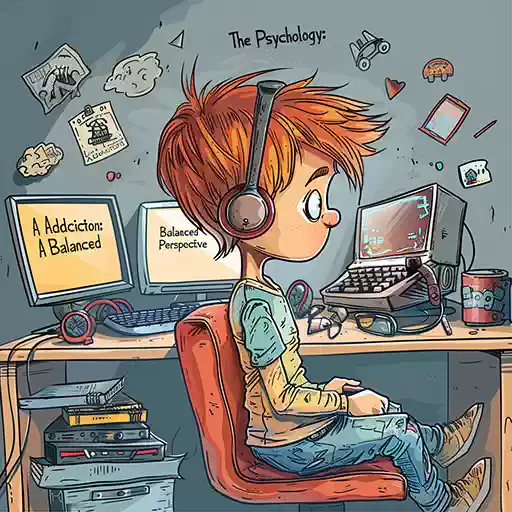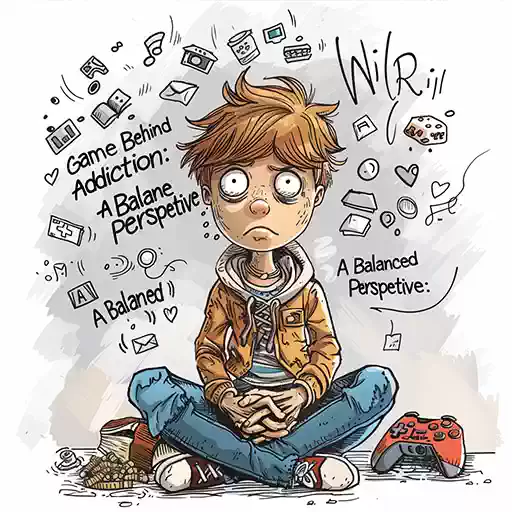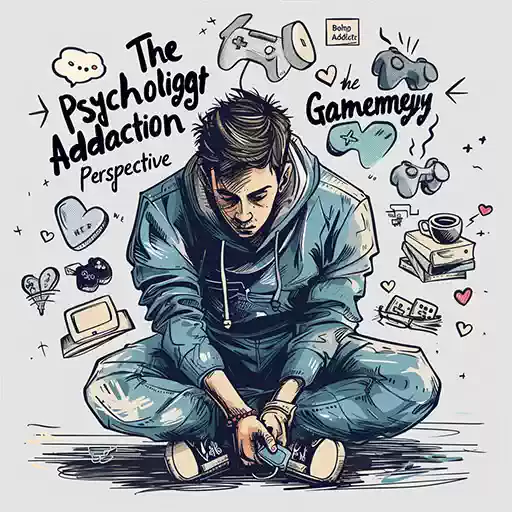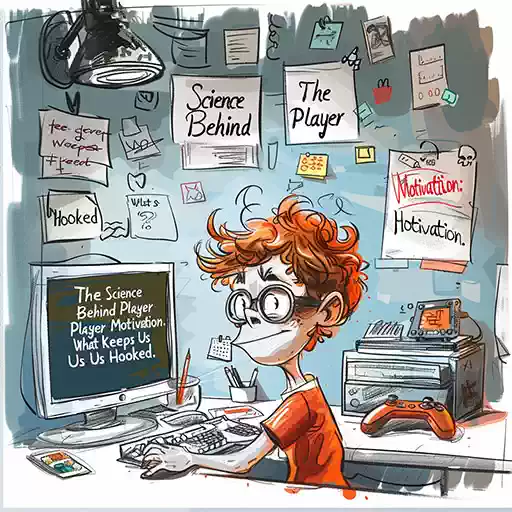The Psychology Behind Game Addiction: A Balanced Perspective
At FOGYX, we recognize the importance of understanding both the positive and potentially negative impacts that gaming can have on individuals. In this article, we’ll explore the psychology behind game addiction, what drives people to play games for extended periods, and how developers and players alike can strike a healthy balance between enjoyment and responsible gaming.

1. Understanding the Appeal of Online Games
To understand why some people may become addicted to gaming, we must first explore what makes online games and free games so appealing in the first place. These games are designed to be fun, engaging, and accessible to players of all skill levels.1.1 The Power of Instant Gratification
One of the biggest appeals of video games is the promise of instant gratification. In many games, players can achieve small goals—like leveling up, unlocking rewards, or completing challenges—within minutes. This constant cycle of achievement provides a steady stream of positive reinforcement, releasing dopamine, the brain’s “feel-good” chemical.This release of dopamine encourages players to continue playing, seeking more rewards and accomplishments. In multiplayer online games, the satisfaction of winning a match or outperforming competitors adds an extra layer of excitement. The more success players experience, the more motivated they become to play, creating a feedback loop of gratification.
1.2 The Social Connection
Many online games also offer a social component that appeals to players. In games with multiplayer modes, players can connect with friends or strangers across the globe, fostering relationships and a sense of community. For some, these online interactions provide a vital social outlet, particularly in times of isolation or loneliness.The ability to communicate and collaborate with other players can make the gaming experience more rewarding. In games like FOGYX Arena, players often form teams, build strategies, and compete together, strengthening bonds and enhancing the sense of achievement when goals are accomplished.
1.3 Escapism and Stress Relief
Another key factor that drives people to play online games is escapism. For many, games provide a temporary escape from the pressures and stresses of daily life. Immersing oneself in a fantasy world where they can control the outcome offers a sense of power and relief from real-world anxieties.For players who feel overwhelmed by work, relationships, or other stressors, games can serve as a refuge—a space where they can relax and enjoy themselves. However, for some, this desire to escape can evolve into excessive play as they rely more and more on games to avoid real-life challenges.

2. The Line Between Enjoyment and Addiction
While most players can enjoy games in moderation, there’s a point where healthy gaming can cross over into addiction. So, what exactly is game addiction?2.1 Defining Game Addiction
Game addiction, often referred to as gaming disorder, is characterized by an inability to control one’s gaming habits, leading to excessive play that interferes with daily life, work, or relationships. The World Health Organization (WHO) recognizes gaming disorder as a mental health condition when the behavior becomes compulsive and persistent, despite negative consequences.It’s important to note that not all passionate gamers are addicted. Many people spend hours playing their favorite online games without it negatively affecting their lives. Addiction arises when gaming becomes a priority above all else—when players neglect responsibilities, social obligations, or even their physical health to continue playing.
2.2 The Role of Reward Systems
One of the psychological factors that contributes to game addiction is the way many games are structured around reward systems. Whether it’s earning points, unlocking achievements, or receiving in-game currency, these rewards stimulate the brain’s pleasure centers, encouraging players to keep going. In some free games, microtransactions—small, in-game purchases—can also play a role in perpetuating this cycle, as players invest more time (and sometimes money) into earning virtual rewards.Some games, especially online games, use random reward systems or “loot boxes,” where players are incentivized to keep playing in hopes of receiving rare or valuable items. This unpredictability can fuel addiction, as players continue to chase that next big reward, similar to the mechanisms behind gambling.

3. The Psychological Mechanisms Behind Game Addiction
To fully understand game addiction, we need to explore the psychological mechanisms at play. Game designers carefully craft experiences that trigger specific responses in the brain, keeping players engaged and, in some cases, hooked.3.1 The Role of Dopamine
Dopamine is the chemical messenger in the brain that plays a central role in motivation, reward, and pleasure. When players achieve something in a game—whether it’s completing a difficult level, defeating a challenging boss, or receiving a rare item—the brain releases dopamine, reinforcing the behavior and motivating players to seek out similar rewards.Over time, frequent dopamine releases can make the brain crave the stimuli provided by gaming. This is one of the reasons why some players feel compelled to return to games even when they know they should take a break or attend to other responsibilities.
3.2 Flow States and Immersion
Another psychological mechanism behind game addiction is the concept of flow, a state of deep focus and immersion in an activity. When players enter a flow state, they become so engrossed in the game that they lose track of time and external distractions. This state is often described as extremely pleasurable and is one of the reasons why games can feel so engaging and addictive.Online games, in particular, are designed to keep players in this state for extended periods. Dynamic, fast-paced gameplay that requires constant focus keeps the player’s attention locked in, making it difficult to step away.
3.3 Fear of Missing Out (FOMO)
The fear of missing out (FOMO) is another factor contributing to game addiction, especially in online games that feature time-limited events, rewards, or challenges. Players may feel compelled to keep playing to avoid missing rare opportunities or falling behind their peers.For example, in free games with seasonal updates or daily challenges, players often feel pressure to log in regularly to complete tasks and claim rewards before they expire. This sense of urgency can lead to longer play sessions and increased engagement, but it can also foster addictive behaviors if players feel unable to step away.

4. Striking a Balance: Encouraging Healthy Gaming Habits
While gaming addiction is a real concern, it’s important to maintain a balanced perspective. For most people, gaming is a positive and rewarding hobby that offers entertainment, social interaction, and stress relief. The key is finding a balance between enjoying games and maintaining healthy habits.4.1 Recognizing the Signs of Addiction
It’s important for players—and their friends and families—to recognize the signs of gaming addiction early on. These signs may include:- Spending increasing amounts of time gaming at the expense of other activities.
- Neglecting work, school, or personal relationships to continue playing.
- Feeling irritable or anxious when unable to play.
- Using gaming as a way to escape from negative emotions or real-life problems.
- Losing interest in activities or hobbies that were previously enjoyed.
If any of these behaviors sound familiar, it may be time to reassess gaming habits and take steps to reduce playtime.
4.2 Setting Limits and Taking Breaks
For players who enjoy online games and free games, setting limits is a practical way to ensure that gaming remains a healthy activity. This can involve setting daily or weekly time limits, taking regular breaks, and scheduling time for other activities, such as exercise, socializing, or pursuing offline hobbies.At FOGYX, we encourage players to take a balanced approach to gaming. While our games are designed to be immersive and fun, we also support responsible gaming by reminding players to take breaks and promoting mindful play.
4.3 Developers’ Role in Promoting Healthy Gaming
Game developers also have a responsibility to promote healthy gaming habits. By designing games with built-in reminders for breaks, limiting the use of manipulative reward systems, and creating content that encourages shorter, more mindful play sessions, developers can help prevent addiction.At FOGYX, we’re committed to creating games that are not only engaging but also promote responsible gaming practices. We strive to find the right balance between offering enjoyable, rewarding gameplay and ensuring that our players have the tools they need to manage their playtime effectively.
Conclusion: A Balanced Perspective on Gaming and Addiction
Gaming is an incredibly enjoyable and rewarding activity for millions of players around the world. From the immersive worlds of online games to the quick fun of free games, the experiences offered by the gaming industry are vast and diverse. However, like any form of entertainment, it’s important to recognize the potential for excessive play and addiction.By understanding the psychology behind game addiction—whether it’s the dopamine-fueled reward systems, the immersive flow states, or the fear of missing out—we can better navigate the gaming world with mindfulness and balance. At FOGYX, we believe that games should be a source of joy, connection, and creativity, and we’re dedicated to supporting players in maintaining a healthy relationship with their favorite games.
After all, the best gaming experience is one that enhances your life—not takes it over.
19 January 2025
More articles

As gamers, we’ve all been there—right in the middle of an intense battle or the final moments of a difficult quest, only to experience a sudden lag, a drop in frame rate, or an unresponsive control. It’s frustrating, right? But the good news is, no matter what device you’re gaming on—whether it’s a high-end PC, a console, or a mobile phone—there are ways to optimize your performance and ensure a smooth gaming experience.

Creating immersive and engaging game worlds is a delicate blend of art, technology, and storytelling. At FOGYX, we don’t just aim to produce online games or free games that entertain—we want to build virtual universes that captivate, inspire, and keep players coming back for more. From the first sketch of a concept to the final polish on a detailed landscape, there’s a creative process behind each game world we develop, a journey that shapes the very heart of the player’s experience.

Ever wonder why some games keep you glued to your screen for hours while others quickly lose their appeal? It’s not just about flashy graphics or intricate storylines—there’s an entire science behind what keeps players engaged and coming back for more. At its core, player motivation is a combination of psychological factors that tap into our need for reward, achievement, and connection. Understanding these elements is essential for game developers, like us at FOGYX, as we aim to create experiences that not only entertain but also resonate on a deeper level.
all articles
